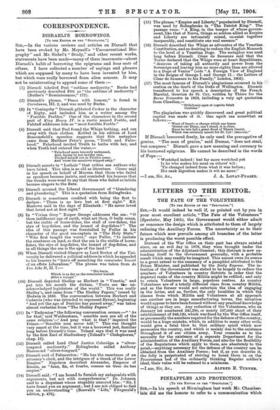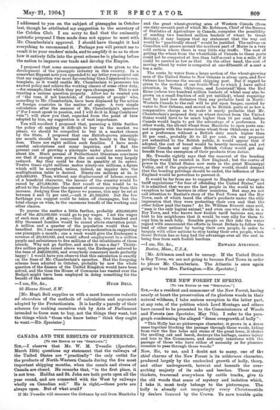' vro THE EDITOR OF TEE "SPECTATOR."]
I addressed to you on. the subject of pineapples in October last, though he attributed my suggestion to the secretary of the Cobden Club. I am sorry to find that the eminently patriotic proposal I then made does not appear to meet with Mr. Chamberlain's approval. I should have thought it bad everything to recommend it. Perhaps you will permit me to recall it to'your readers' minds, and to amplify it so as to show how it entirely falls into the great scheme he is placing before the nation to improve our trade and develop the Empire.
I proposed that some encouragement should be given to the development of the pineapple industry in this country. In a
somewhat flippant note you appended to my letter you pointed out that my suggestion was more far-reaching than I appeared to con- template, as it would enable Mr. Chamberlain to prosecute his avowed policy and relieve the working classes of some other duty, —for exampleithat which they pay upon champagne. This is not treating a serious question properly. Allow me to remind you of 'the tens, if not hundreds, of thousands of people' who, according to Mr. Chamberlain, have been displaced by the action of foreign countries in the matter of sugar. A very simple calculation after the manner of Mr. Chamberlain's speeches (" For I must speak in passion, and I will do it in King Cambyses' vein") will show you that, regarded from the point of view adopted by him, my suggestion is of vast importance.
You will recollect I proposed that, pursuing a little further the policy of making it difficult to buy in the market we please, we should be compelled to buy in a market chosen by the State. I proposed that one British-grown pineapple per month should be consumed by each, family in the king- dom. There are eight million such families. I have made careful calculations and many inquiries, and I find the present cost of growing a pineapple under glass amounts to about 10s. Much perusal of Protectionist literature convinces me that if enough were grown the cost could be very largely reduced. Say they could be done in quantity at 5s. apiece. Twelve times eight millions makes ninety-six millions, a figure which will be accepted, unless, indeed, an inquiry into the multiplication table is desired. Ninety-six millions at 5s. is £24,000,000. Thus without any displacement of labour, except of a beneficial character, the income of the country would be raised by £24,000,000. The first result of this would be to afford to the Exchequer the amount of revenue arising from this increase. Judging from the figures we possess, this may be set at between 5 and 74 per cent,—call it 41,500.000. Not the few farthings you suggest could be taken off champagne, but the total charge on wine, to the enormous benefit of the working and other classes.
To pursue the matter a little, further, probably .e20,000,000 out of the £24,000,000 would go to pay wages. I set the wages of each man at £80 a year,—that is to say, two hundred and fifty thousand families would be raised above starvation point. A million and a quarter of the population would thus be benefited. Sir, I am surprised at my own moderation in suggesting one pineapple a month ; one a week would give the Exchequer a revenue of £6,000,000, and would afford employment to a million people and subsistence to five millions of the inhabitants of these islands. Why not go further, and make it one a day ? Thirty- five million people raised above want, the Exchequer relieved to the tune of £42,000,000, and everybody concerned made perfectly. happy ! I would have you observe that this calculation is exactly on the lines of Mr. Chamberlain's speeches. Had the foregoing scheme been adopted in October, probably by now the whole question of the finance of the United Kingdom would have been. solved, and the time the House of Commons has wasted over the Budget might have been employed in doing something for the benefit of the nation.
—I am, Sir, &c., HUGH BELL.
95 Sloane Street, S. W.
[Mr. Hugh Bell supplies us with a most humorous reductio ad absurdum of the methods of calculation and argument adopted by the Protectionists. It is hardly a parody of their schemes for making ourselves rich by Acts of Parliament intended to force men to buy, not the things they want, but the things which "those who know better" think they ought to want.—En. Spectator.]



































 Previous page
Previous page